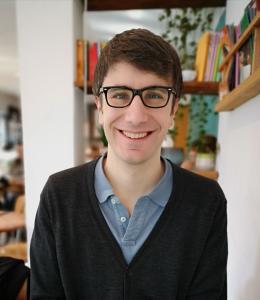
Dr Philippe Bernhard Schmid
Centre for Research Collections Fellowship, February – July 2023
Home Institution: University of St Andrews
My research focuses on the exchange of knowledge in the Republic of Letters in the seventeenth and eighteenth centuries. In 2022, I completed my PhD in Modern History at the University of St Andrews. My dissertation A Culture of Reuse: Libraries, Learning and Memory in Early Modern Germany (2022) traces material practices of reuse and recycling in the wider network of Gottfried Wilhelm Leibniz. Employing a material approach to the history of knowledge, I followed the afterlives of personal libraries and archives after the death of their academic owners, zooming in on forgotten helpers such as widows, families, students, secretaries as well as auctioneers and booksellers, who helped to bring these collections to auction or into an institution. This is where new cycles of use begin, pointing towards a circular culture of ownership in the early modern period. I have written about this ‘vertical’ exchange of information across multiple generations and the reuse of books in Imprimatur. After finishing my thesis, I held fellowships at Berlin State Library, Houghton Library at Harvard University and Durham University in order to prepare my next project, which focuses on a cast of early modern knowledge brokers and their media of communication. First results of my work on intellectual mediators have just been published in Erudition and the Republic of Letters in 2023.
Project Title: Campbell’s Cabinet: Manuscript Culture and the Brokering of Knowledge in the Early Scottish Enlightenment
As a Centre for Research Collections Fellow at Edinburgh, my work focuses on the cabinet of Colin Campbell of Achnaba (1644–1726), which includes an archive of papers, notebooks, letters, drafts and treatises kept at Edinburgh University Library. Scribal culture played a central role for the early modern transmission of knowledge. During the early Enlightenment, the clandestine circulation of manuscripts was especially relevant for knowledge production. Building on the wonderful recent work of Elizabeth Yale, Ann Blair and Matthew Eddy on paper, notebooks and material culture, I use a material angle for the study of this scientific mediator of the early Scottish Enlightenment. Without publishing any books himself, Campbell corresponded with the mathematicians David Gregory, Colin Maclaurin, John Craig and George Sinclair, becoming a widely respected broker in scientific networks. Yet in contrast to early intelligencers of science, such as Samuel Hartlib or Henry Oldenburg in the seventeenth century, Colin Campbell transcends an individual institution like the Royal Society. As minister and presbytery clerk of the Church of Scotland in Ardchattan and Muckairn since 1667, Campbell had access to the networks of ministers who met at the General Assembly of the Church of Scotland. His cabinet of letters, notebooks and drafts both resulted from and inspired the exchange with figures of the early Scottish Enlightenment. It included materials from his wife and children, as accounts, letters and notes were often reused. Tracing Campbell’s family archive and its connection to Newtonianism and other intellectual currents of the time, I hope to reveal processes of intermediation during the early Scottish Enlightenment.
